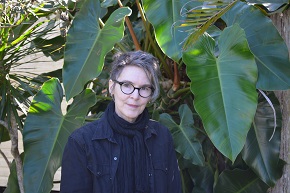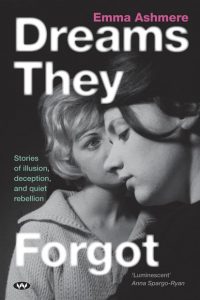Catch a Passing Thought – Writing Dreams They Forgot
 My new book Dreams They Forgot is a collection of twenty-three short stories, a mosaic of diverse characters travelling the high and low roads of time and place. An Irish woman immigrates to 1800s South Australia in search of the land of plenty. A man burdened by secrets appears on a 1970s TV game show. A drought-stricken family treads the line between old-fashioned pragmatism and technological-fanaticism. A timid dropout tries to teach rowdy students in a language school far from home.
My new book Dreams They Forgot is a collection of twenty-three short stories, a mosaic of diverse characters travelling the high and low roads of time and place. An Irish woman immigrates to 1800s South Australia in search of the land of plenty. A man burdened by secrets appears on a 1970s TV game show. A drought-stricken family treads the line between old-fashioned pragmatism and technological-fanaticism. A timid dropout tries to teach rowdy students in a language school far from home.
I never know when or how the idea for a story might appear. I could be working on something completely different, and a sentence snakes into my mind. If I’m stopped in my tracks, I’ll scribble it down before it slinks away.
Other times the zinging scent of orange peel resurrects memories of an best-forgotten cross-country drive. The reedy sound of an old gramophone threading out of a second hand shop might conjure a vision of a long-dead relative. The kind gaze of an 1930s portrait pops up online of an artist wearing a scarf the colour of nasturtiums. Suddenly I’m imagining her feeding stale bread to swans by a river, turning to offer something to a skinny girl watching on.
It’s rare a story arrives fully formed. Most have to be coaxed into being, like chipping away at a lump of marble, trying to find the sculpture waiting inside of it.
But these fleeting sensations are only starting points. Creating a satisfying story means working these raw materials in with other elements, building plot and voice through emotions and circumstance, adding in a fear, a joy, a sorrow, a death, a birth, an impossible situations – plus a hefty dose of imagination and ‘what if.’
The brevity of the short story form means there’s no time for slow-burn set ups, or slow-picking through the rubble after the fact. Start late. Finish early. We might meet the character at the moment their life cracks open. Or perhaps they make a decision, or one is made for them. How will they react? What are the consequences for them and for others? Whole chunks of the narrative might be left out. The reader has to fill the gaps.
My first book, The Floating Garden, was inspired by my friend’s grandmother who lost her house and livelihood for the building of the famous Sydney Harbour Bridge. Her grandmother survived the Great Depression by selling flowers from a suitcase outside a busy city railway station. The image of bright flowers inside a damp battered suitcase sparked my novel.
During the research, I stumbled down alleyways, and labored over storylines which never made it into the book. Sometimes these ‘wrong turns’ became short stories – a welcome side-trip on the long night-drive of the novel.
I didn’t start writing until I was in my mid-30s. I’d always wanted be a writer and kept a journal when I backpacked and hitchhiked around the UK and Europe, racking up experiences in a string of low-paid long-houred hard-scrabble jobs in pubs, kitchens, nursing homes, childcare centres, and offices. I always carried a novel with me, and swapped them with other backpackers.
When Angela Carter’s Heroes and Villains landed in my hands, I couldn’t let it go. Her writing was complex, gritty, frequently alarming, and as daring, dubious, and fabulous as her aerialist protagonist Fevvers in her novel Nights at the Circus. I loved these books because they lived dizzingly high above my ideas of what writing should be. I learnt it pays to look up.
Occasionally a typewriter would come my way. But how to start? A decade later, I enrolled in a creative writing course at Adelaide University, in my home town. We began by writing short stories. Thirty-something years of life fell onto the page. Because I didn’t know what I was doing, I didn’t overthink. It seemed so easy – at first.
I remember reading one of Peter Carey’s stories about a geographer trying to deal with ever-changing maps. Carey used headings. So I tried headings, and wrote my first short story ‘The Language of the Sea’, about two sisters in the 1970s, the year a tsunami was supposed to wipe out their city. I’d remember something about this as a child, researched it – found the real story behind the prediction – and invented a family teetering on the edge of a cliff.
I also began to read much more widely. Because that’s where the most potent ideas gather and replicate: in books.
Whenever people say they have writers block, I say dive into books – not easy ones – but one you’d never usually pick up, books that bemuse or bedazzle the mind, or set your world at a new tilt. You don’t need to backpack to find things to write about.
Accomplished authors take risks to build their paper-and-ink word-houses for their thoughts. It’s how they write something as mundane as walking to the corner shop to buy a packet of salt. In Margaret Atwood’s walk-to-the shop short story ‘Alphinland’, we’re catapulted into a blizzard of uncertainties.
Ideas are everywhere. They hiss in your ear, or boomph past in a crowded car. They rise up from a photograph and puncture your heart. They tear a hole in your reality, armed only with a startling arrangement of letters and words.
As a writer, it’s about taking time to listen, look. It’s about reading closely and widely, and hopefully creating a compelling and memorable miniature world from the scatterings of a by-passing thought before it vanishes.
—
Emma Ashmere’s debut novel The Floating Garden was shortlisted for the 2016 Small Press Network MUBA prize. Her short stories have been shortlisted for major competitions and published internationally. Dreams They Forgot is published by Wakefield Press.
 Dreams They Forgot: Emma Ashmere’s stories explore illusion, deception and acts of quiet rebellion. Undercut with longing and unbelonging, absurdity and tragedy, thwarted plans and fortuitous serendipity, each story offers glimpses into the dreams, limitations, gains and losses of fragmented families, loners and lovers, survivors and misfits, as they piece together a place for themselves in the imperfect mosaic of the natural and unnatural world.
Dreams They Forgot: Emma Ashmere’s stories explore illusion, deception and acts of quiet rebellion. Undercut with longing and unbelonging, absurdity and tragedy, thwarted plans and fortuitous serendipity, each story offers glimpses into the dreams, limitations, gains and losses of fragmented families, loners and lovers, survivors and misfits, as they piece together a place for themselves in the imperfect mosaic of the natural and unnatural world.
“Emma Ashmere’s characters are luminescent. These stories drew me into people and worlds so vivid they practically lived on the page.” —ANNA SPARGO-RYAN, author of The Gulf, and The Paper House.
‘Ashmere’s writing is full of quick insights and telling details. These stories move effortlessly through place and time, entering lives on the point of transgression. It’s an absolute pleasure to travel with them.’ —JENNIFER MILLS, author of Dyschronia, The Rest is Weight, and The Diamond Anchor.
‘Stories of extraordinary range and depth. Deeply engaging and satisfying.’ — PADDY O’REILLY, author of Peripheral Vision, The End of the World, and The Wonders.
‘Ashmere’s prose is precise, almost elusive, reading at times like poetry. The deft description, compelling emotion and insightful observation will appeal to readers of feminist fiction.’— ADAM FORD, BOOKS+PUBLISHING.
—
https://www.facebook.com/Emma-Ashmere-Author-313870212095319/
Twitter: @EmmaAshmere
BUY DREAMS THEY FORGOT:
Category: On Writing






























